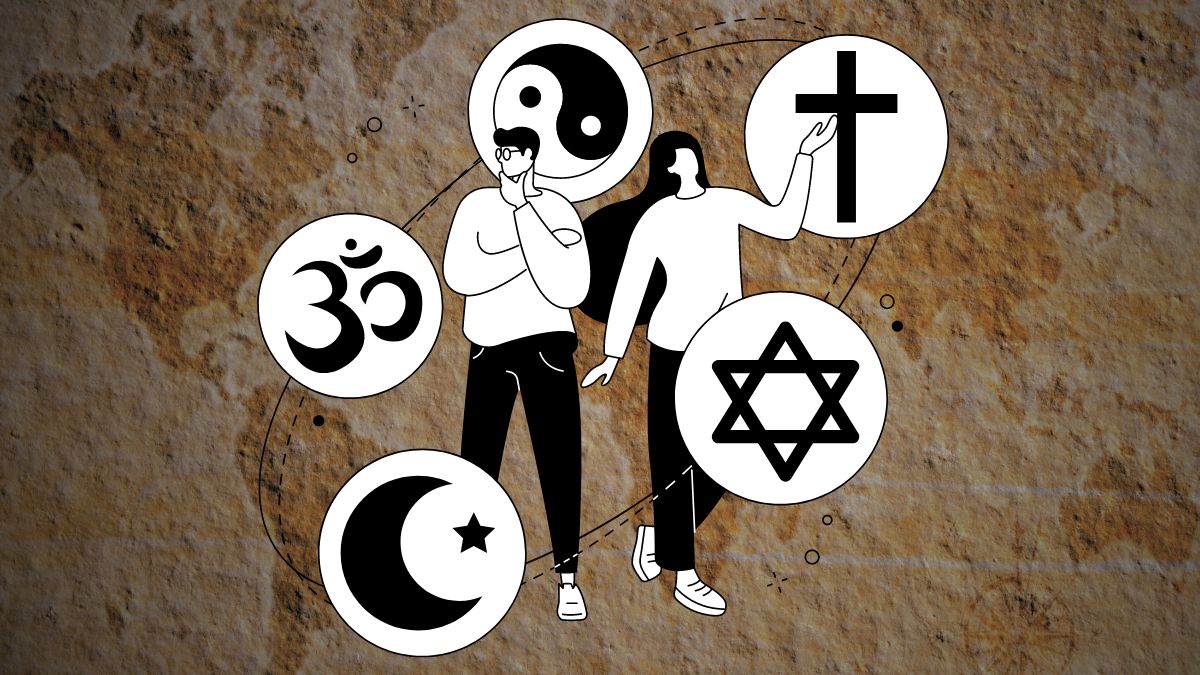Don’t all religions really just point to the same god? It’s easy to see why people would wonder.
But they don’t point to the same god. In fact, the gods are all quite different, particularly the Christian God. So, what makes Christianity different from other world religions?
It really gets down to the character and very nature of God.
It’s easy to assume they’re all the same, until your dig into who God is. And this is an important step in understanding how to address these questions.
similarities of world religions
One of the biggest arguments for all religions pointing to the same god is the similarities between what they believe.
All of the major religions believe that there is a god who created the Universe, and that this god interacts with the world in some way. Most religions believe that prayer and other spiritual disciplines are important (and beneficial). They also mostly believe that the righteous are rewarded, while the wicked are punished.
Beyond that, while there are some differences, there are many common ideas and themes between the religions on what what righteous living looks like. For example, many religions have some form of rule to “love your neighbor.” See the following references:
- Mark 12:31a (Christianity) – “The second [commandment] is this, ‘You shall love your neighbor as yourself.'”
- Leviticus 19:18b (Judaism) – “You shall love your neighbor as yourself: I am the Lord.”
- Qur’an 4:36 (Islam) – “Serve Allah, and join not any partners with Him; and do good- to parents, kinsfolk, orphans, those in need, neighbors who are near, neighbors who are strangers, the companion by your side, the wayfarer (ye meet)…”
- Mahabharata 5,1517 (Hindu) – “This is the sum of duty; do naught onto others what you would not have them do unto you.”
So there are many common roads that all of the major world religions travel. However, just like any journey, it doesn’t mean that there’s only one road that leads everyone to the same destination.

Despite the common values shared between the various world religions, the gods of each are very different. The Triune God of Christianity is very distinct in nature compared to the other religions, which is what we’ll take a look at next…
the Triune God of christianity
The Christian God is unique compared to the gods of other religions. The Christian God is one God, in three persons. These three persons are defined in the Apostles Creed (and defined more deeply in the Nicene and Athanasian Creeds):
I believe in God, the Father almighty,
maker of heaven and earth;
And in Jesus Christ his only Son our Lord;
who was conceived by the Holy Ghost,
born of the Virgin Mary,
suffered under Pontius Pilate,
was crucified, dead, and buried.
He descended into hell.
The third day he rose again from the dead.
He ascended into heaven,
and sitteth on the right hand of God the Father almighty.
From thence he shall come to judge the quick and the dead.
I believe in the Holy Ghost,
the holy catholic Church,
the communion of saints,
the forgiveness of sins,
the resurrection of the body,
and the life everlasting. Amen.
In the creeds, we see God the Father, God the Son, and God the Holy Spirit. All distinctly God in three separate persons, but not three separate gods. All three persons are seen active throughout the Old and New Testaments.
One particular instance in the Christian Bible even provides some insight into the nature and character of the Triune God, which is expressly different than the gods of other religions.
how the Triune God is different than other gods
The Creation story in Genesis 1, we see God (the Father) speaking the Universe into existence. In Genesis 1:2, we even see the Spirit of God hovering over the waters.
There’s also some subject-verb disagreement in Genesis 1:1, which may provide a provide some insight as well. We see, “In the beginning when God (Elohim) created the heavens and earth.” In this, Elohim is a plural noun used with created, which is a singular verb. This shows God creating as a singular act of one, while there seems to be a plural nature in the one who created.
Later in verse 27 we see this same God (Elohim) saying, “Let us make humankind in our image.”
Here’s what I’m getting at…
The Creation story shows us that before anything else, God existed. And that God is responsible for the existence of everything, including us (humankind). Through the rest of the Scriptures, we also see that God is love. This God in three persons existed in love. And it is out of this love, the Triune God creates in order to share this love experience.
In other monotheistic religions, we see a single god creating in order to have someone to love (or to love them). This whole motive is different, and it shows something about the character of those gods. And we see that play out in several other elements of the religions.
other religions teach us to earn our way to god
With the other (non-Christian) religions, there’s always an element of needing to earn your way to God. It’s through your own efforts of prayer, right living, and sometimes other actions that “salvation” is achieved. If you pray the right number of times per day, and follow these rules for life, or whatever, then you might find acceptance from god.
It’s not so with the Christian God. Nothing needs to be done other than simply believing and accepting the gift we’re given.
Romans 5:8 says, “But God demonstrates his own love for us in this: While we were still sinners, Christ died for us.”
There is no earning your way into heaven and a relationship with God. He pursues us, and we only need to recognize and receive it.
While the Christian faith does encourage us to go to church, live a certain way, and even do certain things, none of this is required for our salvation. God the Son died on the cross, beat death, and ascended into Heaven for all of our sins (past, present, and future).
None of this is accomplished by our own actions. There is nothing we can do to earn it. God takes that on himself, which (again) is very different in character than any of the gods of other religions.
rules vs. relationship
This idea of not having to do anything might leave people wondering about all of the “rules” people associate with Christian living. Does this mean we don’t have to go to church? Does it mean that I don’t need to live by the Ten Commandments?
In a nutshell, no. Your salvation does not depend on any of that.
But, in the Christian faith, we’re talking about a relationship with God. And in a relationship, there are things you want to do to maintain the relationship.
For example, in my marriage, do I need to open doors for my wife? No. But I do it because I love and respect her and want to honor her. Do I need to sit and spend time and talk with her after I get home from a long day of work? No. But I do it because I want to spend time with her, and I want her to feel valued. Will my relationship with her end if I don’t do those things? No. It’s still there, but the love may not burn as strongly.
In the same way, Christian living does have ways that we can nurture and grow the relationship. And we do it not only directly with God, but also with each other.
So there are rules for Christian living, but our salvation (and relationship with God) never depends on our actions or ability to live according to those rules.
final thoughts on what makes Christianity different from other world religions
So, what makes Christianity different from other world religions? Ultimately, it gets down to who God is, and what it means to follow Him.
The Triune God of the Christian faith is very different in nature, character, and in what relationship looks like. In the Christian Bible, we see from the very beginning in Creation that this God (Love) created everything in order to share this experience of Love, and all throughout history He has pursued that relationship with us and made a way despite all of our shortcomings.
And even though there are some similarities between the religions and “god’s” role, the path to god and what that relationship looks like is very different. And when put in perspective, doesn’t sound realistic nor attractive (at least to me).
Now if you are unwilling to serve the LORD, choose this day whom you will serve, whether the gods your ancestors served in the region beyond the River or the gods of the Amorites in whose land you are living; but as for me and my household, we will serve the LORD. (Joshua 24:15)
Amen.
P.S. Once we establish who the Christian God is, then we can start looking at other ideas like who we are. Things start to shift when it comes to identity (and self-worth) when we first recognize that we were created by a loving God (and in His image) who pursues us because He loves us so much. But that’s a whole other conversation…




0 Comments